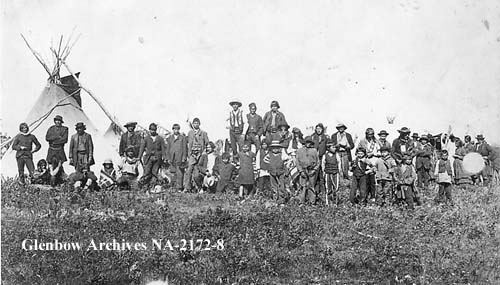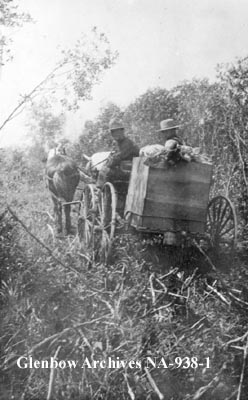The Stoney language is a gift to the Stoney people from the Creator. It embodies all that is fundamental to the identity of a Stoney. Historically, the elders passed this gift on to the younger generations. It took a lifetime to share their knowledge of the language and culture. Today, we live in a fast-paced technological age where we get our information from the media and the internet instantaneously; less time is spent with our elders and the traditional means of passing on the language and culture is not as effective as it once was.
I'sga I?abi recognizes the invaluable resource we have in our elders and the limited amount of time available to use this resource. Therefore, elders will play a significant role in teaching the Stoney language and culture in the school.
Each Stoney community includes a number of different Stoney dialects which are generally distinguished by family clans. Isga I?abi recognizes each dialect as equally legitimate and important as the others. While the instructor teaches his/her own dialect of Stoney, acceptance and understanding of dialectal differences is promoted in the Stoney classroom.

The primary approach to reviving the language has been to teach the Stoney language in the community school. It is a required course for grades 1-9 and an accredited course for high school. Alexis Board of Education was sponsored by the Government of Alberta, Alberta Learning, to develop a High School Stoney Language curriculum for grades 10, 11, and 12. The first two levels are completed and the grade 12 level is currently being developed as well as post-secondary level. When the curriculum is completed then each level of the curriculum will be available for distribution and opportunities for advanced education will be available.

The goal of Isga I?abi is to equip students with the necessary linguistic skills and knowledge to enable them to communicate competently and confidently in Stoney both in school and in community contexts.
Students will develop proficiency in Stoney through experience in various media of communication. Speaking and listening skills will enhance students' cognitive abilities to explore ideas, to organize information, to gain understanding, and to develop the interactive aspect of language (i.e. conversation). Reading and writing skill further enrich students' cognitive development. Literacy provides students with an alternative means of expression and accessing information, which requires comprehension, interpretation of meaning, formulation of thought, and creativity of expression.
Students who learn Stoney will enhance their language skills and their cognitive skills. The development of these second language skills will enhance the development of their first language. Increased proficiency in English will not only boost the students' confidence but it will also improve their academic performance.
Learning Stoney will bridge a generational gap that is intensified by the limited communication between young and old due to language differences. It will provide the students with a means for interacting with their parents and with the older generations who are not fluent in English. Increased interaction between generations and among families will strengthen familial and generational bonds, which in turn will build a sense of unity in the Alexis community.
To learn a language is to gain an understanding of the concepts, philosophies, expressions, lifestyle, and humour unique to that culture. Learning Stoney will open a window of perspective that was not accessible to the English-only student because a Stoney speaker has a unique perspective and understanding of the world that can only be understood through the Stoney language. In this way, being able to speak Stoney will provide the students with the means to explore their Stoney history, spirituality, cultural values, traditions, and beliefs. Gaining an understanding of their culture will help the students to develop a positive self-concept and self-identity.
As more and more people speak Stoney the hope for the preservation of the language grows. Maintaining the language preserves the cultural attitudes and perspectives that are inextricably tied to the language.